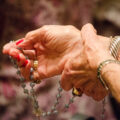COVID-19 and intergenerational awareness in France
COVID-19 and intergenerational awareness in France
During the COVID-19 lockdowns in France, generational conflicts emerged in the media. Did the pandemic bridge generations, or polarise them?
This article is part of our series on the social impact of COVID-19.
Due to COVID-19, French citizens have experienced a series of lockdowns since March 2020.[1] Many had never undergone such severe restrictions of their mobility and sociability. Yet, these impediments were familiar to some of those ageing, or living with a disability.[2] [3] As the memory of lockdowns seems to fade in the past, the question of whether this common living situation bridged generations or polarised them remains open.
In France, the major religious denomination is Catholicism. In the Catholic Church, however, the coexistence of younger and older generations is habitual. For example, more than half of the French Catholic priests are older than 65. Besides, almost half of their parishioners are also over 65 years old.[4] Dealing with the COVID-19 pandemic, how did the Catholic Church use its previous experience with intergenerational solidarity?
Different generations with diverging interests
French President Emmanuel Macron announced the first lockdown in a unifying speech. As he repeatedly declared “war against COVID,” he also called for “general mobilisation.”[5] At this stage, the archetype of ‘the COVID-19 victim’ was statistically understood to be a man, aged 60 years or more.[6] Public solidarity with the patients and medical staff appeared to be indisputable.[7]
However, in the wake of the second and third lockdowns,[8] a generational conflict emerged in the media. For instance, sociologists argued that lockdowns inflict a generational scar on students and young workers. Their chances of economic wellbeing and career development had been and would continue to be hindered, to the benefit of “boomers.”[9] [10] Statistics confirm this backlash.[11] Meanwhile, retirees increasingly expressed worries about the potential carelessness of students and young adults.[12]
Only one communion for every age
While the French government prioritised the health of the older generations,[13] the Catholic Church did not. In this context, the Church’s dilemma was whether to accept or reject governmental rules.[14] Conservative bishops, priests, and believers demonstrated multiple times against the suspension of religious services. Others, including the French Bishops’ Conference, agreed to abide by governmental rules.[15] However, the government finally permitted practising believers to be able to pray and share communion together.[16] Because of Catholic activism, places of worship were in fact granted the right not to prioritise the health of older people.
A new awareness of the living situations of the elderly
Since the second and third lockdowns, more attention has been paid to the dignity of seniors. Indeed, the human dignity of ageing people became a hot topic.[17] Members of the National Ethics Committee made a point that caring for the living is no more important than caring for the dying. They therefore argued that preventative measures such as the isolation of elderly people need to be limited.[18]
In January 2022, awareness around old age grew even more. Indeed, an investigative journalist revealed that the managers of at least 200 nursing homes seriously mistreat their residents. The inhabitants are denied food, exercise, and basic hygiene. Such abuse happened even before COVID-19.[19] Nevertheless, the scandal hit differently after elderly loved ones were stuck in those nursing homes for months on end. Even the younger generations put themselves in seniors’ shoes and publicly worried about the wellbeing of the elderly.[20] [21]
An innovative church for young and old
Catholic communities are familiar with caring for elderly people.[22] Nonetheless, people who felt too vulnerable to physically come to church kept joining Mass online.[23] The experience of lockdowns and remote community seemed to have convinced some older Catholics to stay at home. The average age of the physical congregation was lowered. This resulted in the apparent rejuvenation of the practising Catholic population.[24]
Still, since the beginning of the pandemic, many priests have asked to be able to visit older people in their homes. Lockdowns and concerns for the human dignity of seniors also reinvigorated the call for chaplaincy in hospitals and nursing homes to be considered a human right.[25] The COVID-19 pandemic has shown that the inclusion of all generations within the Catholic Church relies on innovation. Back in 2020, Pope Francis himself asked that Catholics change their “pastoral habits, in response to the presence of so many elderly people in our families and communities.”[26]
Redesigning intergenerational solidarity in a pandemic
The media treatment of the COVID-19 pandemic put (in part) the experience of elderly people centre-stage. Although intergenerational solidarity was not self-evident, multiple initiatives were taken towards mutual support.
During lockdowns, young adults and retired people shared a common interest in feeling useful.[27] This may have facilitated solidarity between generations. Surveys show that older people financially sustained students, who were not necessarily their relatives. In return, young adults helped elders with groceries and digital communication.[28]
However, the meaning of solidarity has changed during the pandemic. In France, the Ministry of Solidarity came up with the motto: ‘Quand on aime ses proches, on ne s’approche pas trop’, meaning ‘When I am close with someone, I do not get close to them’. Physical distancing in fact reduced the opportunities of helping one another. A philosopher notes in the newspaper La Croix that showing solidarity implied not showing solidarity.[29] Paradoxically, generations connected through isolation.
Physical or generational distancing?
The pandemic challenged intergenerational solidarity. During lockdowns, the media raised and testified to a new awareness around the living situations of people of different ages. Such realisation could have led to a generational conflict. On the contrary, it triggered a rethinking of intergenerational solidarity and compassion. However, social institutions like churches were necessary for concretely implementing mutual support among people young and old.
Want to read more about similar topics? Go to the EARS Dashboard.
Sources
[1] COVID-19 pandemic in France – Wikipedia
[2] « Le confinement a mis en lumière le quotidien des personnes handicapées » – Mouvement UP
[3] « Ça fait des années qu’on est confinés ». La crise sanitaire du Covid-19 révélatrice de la condition des proches aidant·e·s de personnes en situation de dépendance | Cairn.info
[4] Religions et démographie en France | Cairn.info
[5] « Nous sommes en guerre » : face au coronavirus, Emmanuel Macron sonne la « mobilisation générale »
[6] INFOGRAPHIE – Coronavirus : quel est le profil des malades en Chine ?
[7] La crainte des soignants, surexposés au Covid-19
[8] COVID-19 pandemic in France – Wikipedia
[9] « La génération confinement paiera pour les boomers »
[10] « Croire qu’une société développée doit protéger ses aînés au détriment de ses jeunes est une erreur »
[11] Moins à risque face à la Covid-19, les jeunes adultes subissent les contrecoups économiques et sociaux de l’épidémie − France, portrait social | Insee
[12] Europe’s invisible divides: How covid-19 is polarising European politics – European Council on Foreign Relations
[13] Crise sanitaire Covid-19 : Publication d’un nouveau plan de protection des personnes âgées à domicile
[14] Reconfinement, l’interdiction des messes publiques contestée
[15] Manifestations pour les messes : “Les autorités catholiques ont l’impression d’être dépassées par leur base conservatrice”
[16] Réouverture des lieux de culte – Sénat
[17] « Les contrôles en Ehpad ne sont pas axés sur la qualité de vie des résidents et le respect de leurs droits fondamentaux »
[18] « Le risque est d’oublier la dignité humaine des personnes âgées et vulnérables » | CNRS Le journal
[19] « Déjà, il y avait cette odeur de pisse terrible, dès l’entrée » : extraits des « Fossoyeurs », une enquête sur le business du grand âge
[20] « Comment être sûr qu’il sera bien traité ? » : après les révélations sur les Ehpad Orpea, le dilemme des familles
[21] Comment allons-nous vieillir ? – On peut plus rien dire | Podcast avec Acast
[22] “La vieillesse n’est pas une maladie, c’est un privilège !”, affirme le pape François
[23] Messes : comment maintenir le lien avec ceux qui ne peuvent revenir à l’église ?
[24] Le difficile retour à l’église après le déconfinement
[25] Scandale Orpea : « Les religions ne doivent pas rester au seuil des maisons de retraite »
[26] Les personnes âgées “sont le présent et l’avenir de l’Église”
[27] Jeunes et vieux face à la Covid : vers plus de solidarité – Centre Avec
[28] Covid-19 – La « guerre des générations » n’aura pas lieu ! | Eurojournalist(e)






